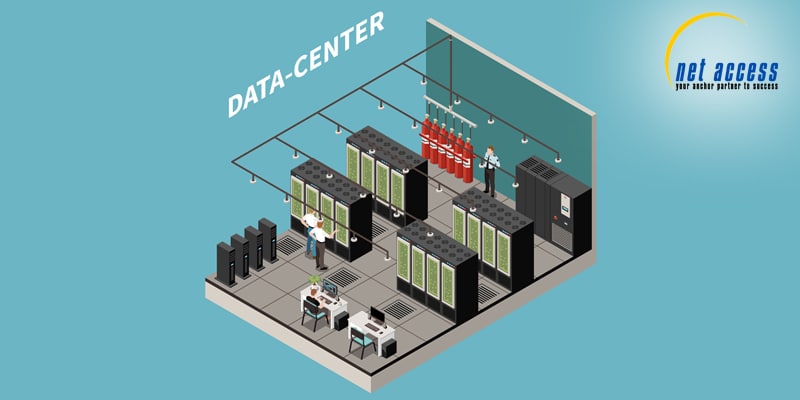
Decoding the Digital Backbone: A Deep Dive into Data Centers and their Crucial Role in Business Operations
In the digital age, where the pace of information flow is relentless, data centers emerge as the silent architects behind the scenes. This comprehensive guide unravels the layers of data centers, exploring their types, unrivalled significance to businesses, core components, operational intricacies, facility specifics, and the stringent standards governing their infrastructure.
What is a Data Center?
A data center is a centralized facility engineered to manage, store, process, and distribute data. Serving as the cornerstone for digital operations, it acts as the beating heart of organizations, facilitating seamless digital activities.
Types of Data Centers:
Delve into the diverse classifications of data centers, ranging from enterprise and cloud to colocation and edge data centers. Each type caters to specific requirements, reflecting the dynamic nature of digital infrastructure.
Enterprise Data Centers:
Tailored for a specific organization’s needs.
Operated and maintained by in-house IT teams.
Primarily used for storing and processing internal data.
Colocation Data Centers:
House servers and equipment for multiple organizations.
Offer shared facilities, reducing costs for businesses.
Provide a secure and controlled environment.
Cloud Data Centers:
Part of cloud service providers.
Deliver scalable and on-demand computing resources.
Promote flexibility and cost-efficiency.
Managed Services Data Centers:
Managed by third-party providers.
Offer comprehensive IT services, from infrastructure to maintenance.
Allow organizations to focus on core activities.
Regional Edge Centers:
Designed to bring data processing closer to end-users.
Enhance latency-sensitive applications.
Support emerging technologies like IoT and 5G.
Enterprise Modular Data Centers:
Deployed in a modular fashion.
Scalable and customizable to accommodate evolving needs.
Optimal for organizations with variable workloads.
Importance to Businesses:
Explore the undeniable significance of data centers to businesses:
– Efficiency Boost: Data centers enhance operational efficiency, ensuring swift access to critical information.
– Scalability: Businesses can scale their digital operations seamlessly, accommodating growth without disruptions.
– Security Assurance: Robust data center security protocols safeguard sensitive information, instilling trust among stakeholders.
– Digital Transformation Catalyst: Data centers play a pivotal role in the ongoing digital transformation, providing the foundation for technological innovation.
Core Components of a Data Center:
Uncover the essential building blocks that compose a data center:
– Servers: The powerhouses executing computational tasks.
– Storage Systems: Facilities for data retention and retrieval.
– Networking Equipment: Ensuring seamless communication and data transfer.
– Power and Cooling Infrastructure: Vital components to maintain optimal operating conditions.
Operational Mechanisms: How Data Centers Operate:
Gain insights into the operational dynamics of data centers:
– Data Processing: The intricate process of handling and manipulating data.
– Storage Management: Efficient storage allocation and retrieval processes.
– Network Connectivity: Seamless data transfer within and beyond the data center.
– Virtualization: Maximizing resource utilization through virtualization technologies.
What’s Inside a Data Center Facility?
Explore the physical components that constitute a data center facility:
– Server Racks: Organized structures housing servers and networking equipment.
– Cabling Systems: Intricate networks of cables for data transfer.
– Cooling Systems: Ensuring a controlled environment to prevent overheating.
– Backup Generators: Safeguarding against power outages for uninterrupted operations.
– Security Measures: Comprehensive security protocols to protect against unauthorized access
Standards for Data Center Infrastructure:
Navigate through the stringent standards governing data center infrastructure:
– Uptime Institute’s Tier Classification: Ensuring reliability and performance benchmarks.
– TIA-942: Covering telecommunications infrastructure in data centers.
– ISO 27001: Focusing on information security management systems.
Conclusion:
Data centers are not just technological hubs; they are strategic assets that propel businesses into the future. This comprehensive guide aims to demystify the world of data centers, shedding light on their types, importance, core components, operational mechanisms, facility specifics, and adherence to industry standards. Armed with this understanding, businesses can harness the full potential of data centers for transformative success.
Ready to elevate your digital infrastructure? Explore advanced data center solutions tailored to your business needs. Contact us today to embark on a journey of seamless digital operations!

